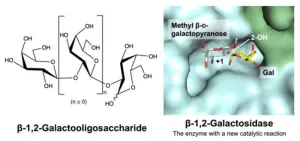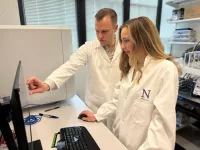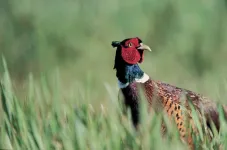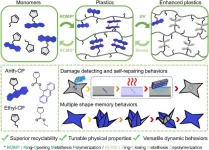(Press-News.org)
Carbohydrate chains, or glycans, are complex sugar-like compounds that play important roles in various biological processes and structures in our bodies. Galactosides are a type of glycan found in plants, animals, and microorganisms. For example, galactosides are present in plant cell walls and in certain types of beneficial sugars known as prebiotic oligosaccharides, which support gut health. Many glycans containing galactose are also added to processed foods like juice and powdered milk due to their potential health benefits. Studying the enzymes that break down these glycans is essential for understanding their prebiotic mechanisms and for improving the way they can be used in food and health products.
β-Galactosidases are enzymes that release galactose from galactosides. However, different β-galactosidases target specific galactosides. These enzymes are found in the intestines of mammals, such as in the human gut bacteria Bifidobacterium, which helps digest complex carbohydrates. Recent studies have shown that another gut bacterium, Bacteroides xylanisolvens, has the potential to utilize a broad range of carbohydrates, though little is known about its exact abilities.
In a groundbreaking study, a research team led by Associate Professor Masahiro Nakajima from the Department of Applied Biological Science, Faculty of Science and Technology at the Tokyo University of Science (TUS), Japan, discovered a novel β-galactosidase enzyme in B. xylanisolvens. This enzyme specifically targets unique galactose-containing glycans which may possess prebiotic properties. The team included Mr. Yutaka Nakazawa from TUS, Associate Professor Hiroyuki Nakai from Niigata University, and Assistant Professor Tomohiko Matsuzawa from Kagawa University. This study was published online in Communications Biology on January 16, 2025.
Discussing the motivation behind their study, Dr. Nakajima explains, “Although there are numerous types of glycans with diverse and complex structures, many glycans still have unknown functionality and potential uses. Since enzymes are essential for the synthesis of glycans, the search for new enzymes is extremely important. Our novel enzyme could be used to synthesize large amounts of unique glycans with prebiotic properties that may be beneficial to human health.”
B. xylanisolvens contains multiple genes encoding β-galactosidases. The researchers identified that one of these genes, Bxy_22780, encodes a novel β-galactosidase. Initially, the enzyme showed no activity towards natural β-galactosides. However, when reactions were conducted in the presence of a nucleophile mutant, α-D-galactosyl fluoride (α-GalF) as a donor substrate, and galactose or D-fucose as an acceptor substrate, the team successfully detected reaction products. Nuclear magnetic resonance studies confirmed that the disaccharide produced in the reactions was β-1,2-galactobiose.
Further studies on the specificity of the Bxy_22780 enzyme revealed that it is highly specific for galactooligosaccharides (GOS), which is a mixture of oligosaccharides with various linkages. Notably, this enzyme exclusively targets GOS that have a specific type of chemical bond, called β-1,2-galactosidic linkages. Kinetic analysis also revealed that this enzyme effectively acts on β-1,2-galactobiose and β-1,2-galactotriose. To understand why the enzyme is selective, the researchers examined the structure of the enzyme using X-ray diffraction studies. They discovered that the enzyme binds to a molecule called methyl β-galactopyranose at a key site called subsite +1. The structure showed that the molecule's chemical group is positioned in a way that is perfectly suited for breaking down these particular sugar chains. This unique structure explains why the enzyme is highly specific for β-1,2-galactooligosaccharides.
“β-1,2-Galactooligosaccharides and the enzymes are rarely reported. Our discovery is a crucial step toward understanding the functions of these unique glycans, whose roles are largely unknown,” explains Dr. Nakajima. “Furthermore, while there is currently no evidence that β-1,2-galactooligosaccharides possess prebiotic properties, they hold potential in this regard. This enzyme could also open new therapeutic avenues for treating diseases like Chagas disease, caused by a parasite that produces glycans containing these structures. This novel enzyme could therefore not only help improve human gut health but also contribute to developing new life-saving drugs.”
The discovery of Bxy_22780 marks a significant breakthrough in prebiotic research, unlocking exciting opportunities for improving human health. This enzyme could drive the development of innovative prebiotic products to enhance gut health and support digestive functions, offering new opportunities in the food and supplement industries.
***
Reference
DOI: 10.1038/s42003-025-07494-1
Further Information
Dr. Masahiro Nakajima
Department of Applied Biological Science
Tokyo University of Science
Email: m-nakajima@rs.tus.ac.jp
END
A new study published in the journal Human-Animal Interactions has revealed that exposure to wildlife and forest walks can help ease the symptoms of Post Traumatic Stress Disorder (PTSD) in US war veterans.
Researchers from UMass Chan Medical School studied 19 veterans with PTSD or PTSD symptoms and found that walking in the forest, assisting with wildlife care in a rehabilitation centre, seeing wildlife in a sanctuary, and bird watching improved psychological symptoms, especially reducing anxiety.
Those that took part in the near four-month study in Massachusetts ...
[Vienna, 06.02.2025]—"In this study, we use the spatial social connections of people within the 50 largest cities in the US to test whether the built environment—in this case, urban highways— is indeed a barrier to social ties, as has long been assumed in urban studies. For the first time, we are also finding quantitatively that this is the case,” explains co-author Sándor Juhász. During his postdoctoral fellowship at the Complexity Science Hub (CSH), Juhász participated in the study.
This ...
MEDIA CONTACT: Kristin Samuelson at 847-769-6596 or ksamuelson@northwestern.edu
EMBARGOED FOR RELEASE: 5 a.m. (ET), Thursday, March 6, 2025
Alzheimer’s treatment may lie in the brain’s own cleanup crew
Brain’s immune cells cleared plaques, restored a healthier brain environment in immunized patient brains
Current FDA-approved Alzheimer’s drugs remain controversial, with modest benefits, high cost
First time cutting-edge technique spatial transcriptomics was used on human clinical-trial brains with Alzheimer’s disease
Findings could reshape the future of Alzheimer’s ...
Climate change is rapidly reducing the ability of banana producers to supply one of our favourite fruits.
New research from the University of Exeter, published in Nature Food, has found it will be economically unsustainable by 2080 for many areas across Latin America and the Caribbean to continue growing bananas for export, because of rising temperatures caused by climate change.
Bananas are a key export crop worth $11 billion (£8.9 billion) annually and are crucial for the economies of many countries. Yet in just over half a century, 60 per cent of the regions currently producing bananas will ...
Curtin University researchers have discovered the world’s oldest known meteorite impact crater, which could significantly redefine our understanding of the origins of life and how our planet was shaped.
The team from Curtin’s School of Earth and Planetary Sciences investigated rock layers in the North Pole Dome — an area of the Pilbara region of Western Australia — and found evidence of a major meteorite impact 3.5 billion years ago.
Study co-lead Professor Tim Johnson, from Curtin University, said the discovery significantly ...
A voluntary pledge made by UK shooting organisations in 2020 to replace lead shot with non-toxic alternatives by 2025 has failed, analysis by Cambridge researchers finds.
The pledge, made in February 2020 by the UK’s nine leading game shooting and rural organisations, aimed to benefit wildlife and the environment and ensure a market for the healthiest game meat food products.
But a Cambridge team, working with the University of the Highlands and Islands, has consistently shown that lead shot was not being phased out quickly enough to achieve ...
A study led by Dr. Rodrigo Quian Quiroga, group leader of the Neural Mechanisms of Perception and Memory Research Group at the Hospital del Mar Research Institute, has allowed scientists to observe for the first time how neurons in the human brain store memories independent of context in which they are acquired. Published in Cell Reports, the study confirms that neurons can distinguish objects or people regardless of their context, enabling the formation of higher and more abstract relationships, ...
A new paper in the Journal of Breast Imaging, published by Oxford University Press, indicates that breast cancer mortality rates have stopped declining in women older than age 74, and reconfirms that breast cancer mortality rates have stopped falling in women younger than age 40. This finding for older women is new.
Breast cancer is the second leading cause of cancer deaths in American women, with over 42,000 women dying of the disease in 2024. Before 1990, female breast cancer rates had been rising, and breast cancer mortality rates had been flat or increasing. Since 1990 there has been a steady decline ...
Plastics, which are polymeric materials composed of long chains of small molecules called monomers, are widely used in everyday life and industry due to their lightweight, good strength and flexibility. However, with approximately 52 million tons of plastic waste generated annually, plastic pollution has become a major environmental concern. To address this issue, research efforts have focused on developing sustainable polymeric materials. Unfortunately, most materials developed so far suffer from complex synthesis processes or difficulties in separating them from other polymers during waste disposal.
To overcome these limitations, a research team led by Dr. Tae Ann Kim of the Convergence ...
A type of Artificial Intelligence that mimics the functioning of the human brain could represent a powerful solution in automatically detecting wildfires, plummeting the time needed to mitigate their devastating effects, a new study finds.
The new technology uses an ‘Artificial Neural Networks’ model that combines satellite imaging technology with deep learning (a subset of Artificial Intelligence (AI) and machine learning).
Findings, published in the peer-reviewed International Journal of Remote Sensing, report a 93% success rate when training the model via a dataset ...




